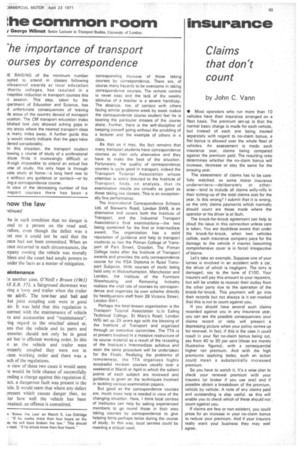Claims that don't count
Page 65

If you've noticed an error in this article please click here to report it so we can fix it.
by John C. Vann
• Most operators who run more than 10 vehicles have their insurance arranged on a fleet basis. The premium set-up is that the normal basic charge is made for each vehicle, but instead of each one being treated separately with regard to no-claim bonus, a flat bonus is allowed over the whole fleet of vehicles. An assessment is made each insurance year, claims being compared against the premium paid. The resulting ratio determines whether the no-claim bonus will increase, decrease or stay the same for the ensuing year.
The assessment of claims has to be carefully watched, as some motor insurance underwriters—deliberately or otherwise—tend to include all claims willy-nilly in their totting-up of the total claims cost for the year. Is this wrong? I submit that it is wrong, as the only claims payments which normally should count are those made where the operator or his driver is at fault.
The knock-for-knock agreement can help to cloud the issue in this connection unless care is taken. You are doubtless aware that under the knock-for-knock, when twd vehicles collide, each insurance company pays for the damage to the vehicle it insures (assuming comprehensive cover is in force) irrespective of blame.
Let's take an example. Suppose one of your lorries is involved in an accident with a car, the driver of which is negligent. The lorry is damaged, say to _the tune of £100. Your insurers will pay this amount to your repairers, but will be unable to recover their outlay from the other party due to the operation of the knock-for-knock. This payment will go into their records but not always is it ear-marked that this is not to count against you.
If you should have several such claims recorded against you in any insurance year, you can see the possible consequences; your claims record or ratio will present a depressing picture when your policy comes up for renewal. In fact, if this is the case it could result in your flat no-claim bonus being cut, say from 40 to 30 per cent (these are merely illustrative figures), with a consequential higher net premium. And with the high premiums applying today, such an action could mean a substantially increased premium.
So you have to watch it. It's a wise plan to check your renewal premium with your insurers (or broker if you use one) and if possible obtain a breakdown of the premium, vehicle by vehicle. A note of any claims paid and outstanding is also useful, as this will enable you to check which of these should not. count against you.
If claims are few or non-existent, you could press for an increase in your no-claim bonus to reduce your premium. And if your insurers really want your business they may well agree.




























































































































